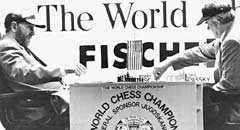Japan will consider sending former world chess champion Bobby Fischer to Iceland once it confirms that he has been granted citizenship there, Japanese Justice Minister Chieko Nohno said on Tuesday.
Iceland's parliament granted Fischer citizenship on Monday, opening the door for the fugitive American to settle in the tiny North Atlantic republic where he won the world title in 1972.
"I have not received a report on this ... so it is difficult to reply as I have no clear information," Nohno told reporters.
Fischer, 62, is currently in detention in Japan fighting a U.S. deportation order.
But Nohno reiterated that it was legally possible for Fischer to be deported to Iceland if he had citizenship there.
"If that is the situation, the immigration authorities will consider appropriately with regard to his deportation destination," she said.
 Fischer is wanted in the United States for violating sanctions against the former Yugoslavia by playing a chess match there in 1992. He was arrested in Japan last July for travelling on an invalid U.S. passport.
Fischer is wanted in the United States for violating sanctions against the former Yugoslavia by playing a chess match there in 1992. He was arrested in Japan last July for travelling on an invalid U.S. passport.
Iceland's single-chamber assembly approved citizenship for Fischer by 40 votes in favour and none against, said parliamentarian Bjarni Benediktsson. He told Reuters the decision would enter into force within the next few days.
Fischer's lawyer, Masako Suzuki, said she had been told by the Icelandic ambassador to Japan earlier on Tuesday that the decision was expected to take effect with the signing later in the day by President Olafur Ragnar Grimsson.
She said Fischer had asked Iceland's government to issue a passport to him as an Icelandic citizen.
She said Fischer could leave Japan for Iceland within several days.
| |||||||||||
Chess fans in Iceland, where Fischer won the world title in 1972 in a classic Cold War encounter with Soviet champion Boris Spassky, offered him a home late last year and lobbied officials to issue him a special passport to travel there.
Fischer had disappeared after the 1992 match, in which he beat his old rival Spassky and pocketed $3 million, and did not resurface until after the Sept. 11, 2001 attacks in the United States.
He has spent recent years moving around Europe and Asia to dodge deportation.







